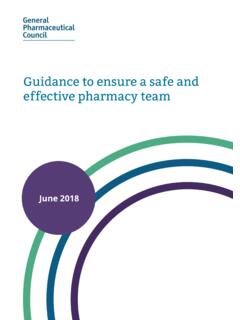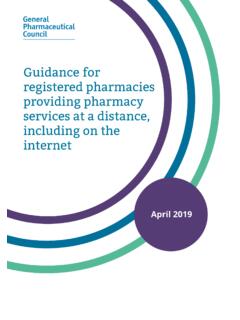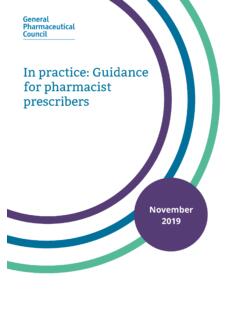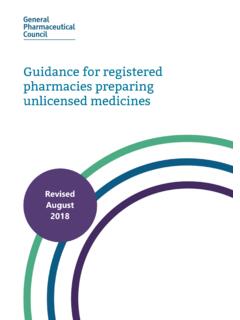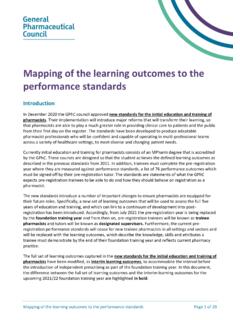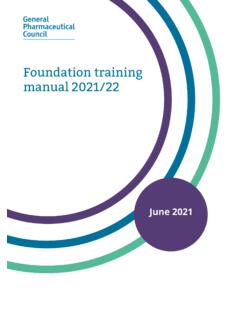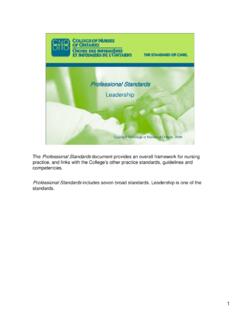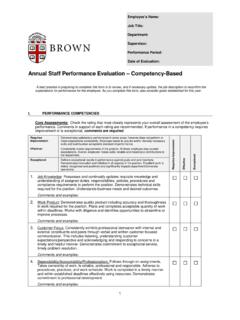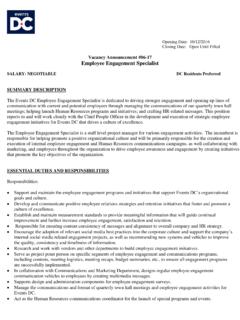Transcription of Standards for pharmacy professionals
1 Standards for pharmacy professionalsMay 2017 Standards for pharmacy professionals2 May 2017 The text of this document (but not the logo and branding) may be reproduced free of charge in any format or medium, as long as it is reproduced accurately and not in a misleading context. This material must be acknowledged as General Pharmaceutical Council copyright and the document title specified. If we have quoted third party material, you must get permission from the copyright us at if you would like a copy of the document in another format (for example, in larger type or in a different language). General Pharmaceutical Council 20173 About usThe General Pharmaceutical Council regulates pharmacists, pharmacy technicians and registered pharmacies in Great we doOur main work includes: setting Standards for the education and training of pharmacists and pharmacy technicians, and approving and accrediting their qualifications and training maintaining a register of pharmacists, pharmacy technicians and pharmacies setting the Standards of conduct and performance that pharmacy professionals have to meet throughout their careers setting the Standards of continuing professional development that pharmacy professionals have to achieve throughout their careers investigating concerns that pharmacy professionals are not meeting our Standards .
2 And taking action to restrict their ability to practise when this is necessary to protect patients and the public setting Standards for registered pharmacies which require them to provide a safe and effective service to patients inspecting registered pharmacies to check if they are meeting our standardsStandards for pharmacy professionals4 May 2017 The Standards for pharmacy professionals5 There are nine Standards that every pharmacy professional is accountable for meeting. The Standards apply to all pharmacists and pharmacy technicians. We know that pharmacy professionals practise in a number of sectors and settings and may use different ways to communicate with the people they provide care to. The Standards apply whatever their form of practice. And even when pharmacy professionals do not provide care directly to patients and the public, their practice can indirectly have an impact on the safe and effective care that patients and the public receive, and on the confidence of members of the public in pharmacy as a whole.
3 6 The Standards need to be met at all times, not only during working hours. This is because the attitudes and behaviours of professionals outside of work can affect the trust and confidence of patients and the public in pharmacy professionals . 7 The meaning of each of the Standards is explained, and there are examples of the types of attitudes and behaviours that pharmacy professionals should demonstrate. The examples may not apply in all situations. 8 The Standards include the term person-centred care and refer to a person throughout. This means the person receiving care . The term may also apply to carers or patients representatives depending on the situation. 1 pharmacy professionals (pharmacists and pharmacy technicians) play a vital role in delivering care and helping people to maintain and improve their health, safety and wellbeing. The professionalism they demonstrate is central to maintaining trust and confidence in Patients and the public have a right to expect safe and effective care from pharmacy professionals .
4 We believe it is the attitudes and behaviours of pharmacy professionals in their day-to-day work which make the most significant contributions to the quality of care, of which safety is a vital part. 3 The Standards for pharmacy professionals describe how safe and effective care is delivered through person-centred professionalism . The Standards are a statement of what people expect from pharmacy professionals , and also reflect what pharmacy professionals have told us they expect of themselves and their colleagues. 4 At the heart of the Standards is the principle that every person must be treated as an individual. pharmacy professionals have an important role in involving, supporting and enabling people to make decisions about their health, safety and wellbeing. For example, what is important to one person managing their short or long-term condition may not be important to Standards and pharmacy students and trainees 9 The Standards for pharmacy professionals are relevant to all pharmacy students and trainees while they are on their journey towards registration and practice.
5 The Standards explain the knowledge, attitudes and behaviours that will be expected of students and trainees if they apply to join the register. 10 They should be interpreted in the context of education and training and used as a tool to prepare students and trainees for registration as a pharmacy professional . 11 pharmacy students and trainees should consider the Standards as they move closer to registration and professional practice, and should read them alongside other relevant documents that are provided by initial education and training Standards and registration12 The Standards are designed to reflect what it means to be a pharmacy professional . They are also at the heart of initial education and training, registration and renewal as a pharmacy professional , and continuing fitness to remain the standards13 pharmacy professionals are personally accountable for meeting the Standards and must be able to justify the decisions they We expect pharmacy professionals to consider these Standards , their legal duties and any relevant guidance when making The Standards and supporting explanations do not list the legal duties pharmacy professionals have, as all pharmacy professionals must keep to the relevant laws.
6 Relevant guidance is published by a number of organisations, including professional leadership bodies, other regulators, the NHS, National Institute for Health and Care Excellence and Scottish Intercollegiate Guidelines Network, as well as by the There will be times when pharmacy professionals are faced with conflicting legal and professional responsibilities. Or they may be faced with complex situations that mean they have to balance competing priorities. The Standards provide a framework to help them when making professional judgements. pharmacy professionals must work in partnership with everyone involved, and make sure the person they are providing care to is their first for pharmacy professionals6 May 2017 Standards for pharmacy professionalsAll pharmacy professionals contribute to delivering and improving the health, safety and wellbeing of patients and the public. professionalism and safe and effective practice are central to that professionals must:1 provide person-centred care 2 work in partnership with others 3 communicate effectively 4 maintain, develop and use their professional knowledge and skills 5 use professional judgement 6 behave in a professional manner7 respect and maintain the person s confidentiality and privacy8 speak up when they have concerns or when things go wrong 9 demonstrate leadership 7 Safe and effective carePerson-centred carePartnership workingEffective communicationProfessional knowledge and skillsSpeaking up about concernsProfessional behaviourProfessional judgementEffective leadershipConfidentiality and privacyStandards for pharmacy professionals8 May 2017 Applying the standardEvery person is an individual with their own values, needs and concerns.
7 Person-centred care is delivered when pharmacy professionals understand what is important to the individual and then adapt the care to meet their needs making the care of the person their first priority. All pharmacy professionals can demonstrate person-centredness , whether or not they provide care directly, by thinking about the impact their decisions have on people. There are a number of ways to meet this standard, and below are examples of the attitudes and behaviours expected. People receive safe and effective care when pharmacy professionals : obtain consent to provide care and pharmacy services involve, support and enable every person when making decisions about their health, care and wellbeing listen to the person and understand their needs and what matters to them give the person all relevant information in a way they can understand, so they can make informed decisions and choices consider the impact of their practice whether or not they provide care directly respect and safeguard the person s dignity recognise and value diversity, and respect cultural differences making sure that every person is treated fairly whatever their values and beliefs recognise their own values and beliefs but do not impose them on other people take responsibility for ensuring that person-centred care is not compromised because of personal values and beliefs make the best use of the resources available Standard 1.
8 pharmacy professionals must provide person-centred care9 Applying the standardA person s health, safety and wellbeing are dependent on pharmacy professionals working in partnership with others, where everyone is contributing towards providing the person with the care they need. This includes the person and will also include other healthcare professionals and teams. It may also include carers, relatives and professionals in other settings such as social workers and public health officials. There are a number of ways to meet this standard and below are examples of the attitudes and behaviours expected. People receive safe and effective care when pharmacy professionals : work with the person receiving care identify and work with the individuals and teams who are involved in the person s care contact, involve and work with the relevant local and national organisations demonstrate effective team working adapt their communication to bring about effective partnership working take action to safeguard people, particularly children and vulnerable adults make and use records of the care provided work with others to make sure there is continuity of care for the person concernedStandard 2: pharmacy professionals must work in partnership with othersStandards for pharmacy professionals10 May 2017 Applying the standardCommunication can take many forms and happens in different ways.
9 Effective communication is essential to the delivery of person-centred care and to working in partnership with others. It helps people to be involved in decisions about their health, safety and wellbeing. Communication is more than giving a person information, asking questions and listening . It is the exchange of information between people. Body language, tone of voice and the words pharmacy professionals use all contribute to effective communication. There are a number of ways to meet this standard and below are examples of the attitudes and behaviours receive safe and effective care when pharmacy professionals : adapt their communication to meet the needs of the person they are communicating with overcome barriers to communication ask questions and listen carefully to the responses, to understand the person s needs and come to a shared decision about the care they provide listen actively and respond to the information they receive in a timely manner check the person has understood the information they have been given communicate effectively with others involved in the care of the personStandard 3.
10 pharmacy professionals must communicate effectively11 Applying the standardPeople receive safe and effective care when pharmacy professionals reflect on the application of their knowledge and skills and keep them up-to-date, including using evidence in their decision making. A pharmacy professional s knowledge and skills must develop over the course of their career to reflect the changing nature of healthcare, the population they provide care to and the roles they carry out. There are a number of ways to meet this standard and below are examples of the attitudes and behaviours expected. People receive safe and effective care when pharmacy professionals : recognise and work within the limits of their knowledge and skills, and refer to others when needed use their skills and knowledge, including up-to-date evidence, to deliver care and improve the quality of care they provide carry out a range of continuing professional development (CPD) activities relevant to their practice record their development activities to demonstrate that their knowledge and skills are up to date use a variety of methods to regularly monitor and reflect on their practice, skills and knowledge Standard 4: pharmacy professionals must maintain, develop and use their professional knowledge and skillsStandards for pharmacy professionals12 May 2017 Applying the standardPeople expect pharmacy professionals to use their professional judgement so that they deliver safe and effective care.
